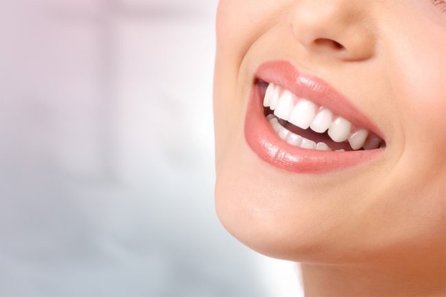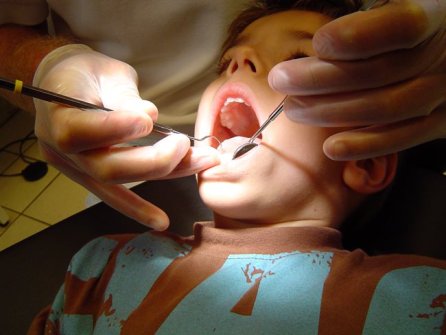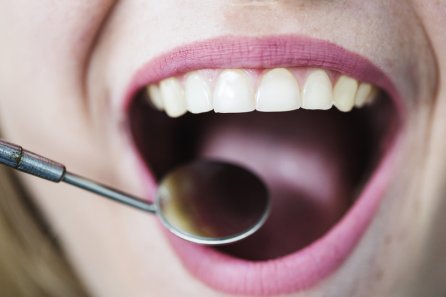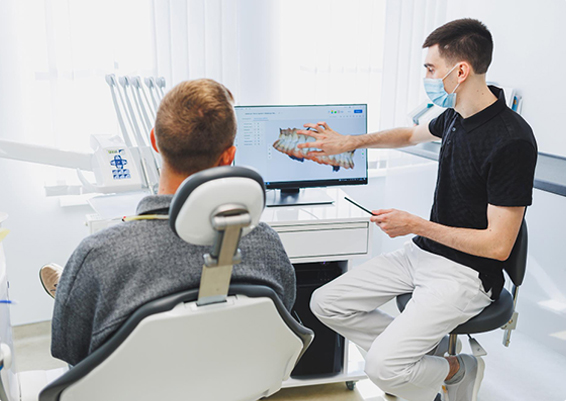
In our society the desire to look attractive is no longer considered vanity. It’s scientifically proven that the first feature someone notices about a face is the mouth and that the earlier in life the appearance is improved, the more likely it is that the person goes through life with a positive self-image. In a competitive world it’s a necessity, both socially and economically.
If you have crooked or irregular teeth, there is no better way of straightening these than with Orthodontics. Generally, orthodontic treatment is used on younger patients and most orthodontists will want to start brace treatment when all the adult eye-teeth or canines are through, which generally occurs at about thirteen years or so.
Adult Orthodontics is now a routine procedure in this country. It's understandable that adults are less willing to sport metal wires and brackets on their front teeth, so the profession has had to come up with alternative materials and procedures to overcome this. Tooth coloured wires and ceramic brackets will often disguise the appearance of braces for all but the closest examination. If this is still too obvious, then in some circumstances lingual braces can be worn. These are fixed to the inner surface of the teeth and so are not seen when smiling.
Even cleverer techniques have now been developed using Computer Aided Design and Computer Aided Manufacture or CAD/CAM. In this technique the existing teeth are scanned electronically and computer models of the teeth are ‘moved’ step by step until the desired appearance has been reached. At each stage of the movement, small transparent mouthguards are made to fit over the teeth and gently push them towards a better position. But, be warned, these techniques are not suitable for everyone and are usually more expensive and slower that conventional braces.
To find out more about improving the appearance of your smile you can visit the British Dental Health Foundation website or contact us on 01993 831396.

Tooth whitening has become a very popular dental treatment that can remove everyday stains and vastly improve your smile...
Here we discusses all aspects of tooth whitening, explaining the benefits, the procedure, and why it is actually a healthy option!
As the years go by, our teeth naturally darken due to staining from tea, coffee, tobacco and wine. Everybody wants lighter, brighter teeth, the same light and bright colour they were when we first had them, as research has shown that a patient aged 45 years or older looks 10 years younger if their teeth are whitened.
It's a 'scalpel free' face-lift!
Dentists want to whiten teeth because there is no other technique,other than Orthodontics or 'braces', which does as little damage to the teeth than bleaching. Whitening with hydrogen peroxide or carbamide peroxide has been practised since the middle 1980s and shown to be safe and effective.
The only other ways of improving the appearance of front teeth are by crowning, capping or by placing porcelain and composite resin veneers.
- Crowning has been used for many years to restore unsightly or damaged teeth. Though successful in most cases, about 60% of the tooth is removed when crowning and this can lead to a weakened tooth and fracture, or even a dead nerve later.
- Porcelain veneers are less destructive, but still involve some tooth removal. They may last 5 to 12 years before fracture or discoloured edges can become a problem.
- Composite veneers are the least destructive and can usually be placed with little or no tooth preparation. They last 3 to 7 years before they need re-facing, depending on how much you smoke or consume staining food, such as red wine or black coffee.
But why should Dentists worry about how much tooth is removed when a restoration is prepared?
Because our patients are living longer and longer and retaining their teeth into old age, we dentists have a duty to restore teeth by removing as little enamel or dentine as possible. Every technique used where dentists remove health tooth weakens it and could lead to its extraction in the long term.
So that's why bleaching is such a healthy option!
Since November 2012 the law conerning bleaching in the UK has changed and dentists in the European Union are now able to whiten teeth with hydrogen peroxide up to a maximum concentration of 6%. This has meant that all the Power Whitening techniques, which you may have seen advertised involving heat, light or lasers, are no longer used in this country and have been withdrawn from the market.
So if you want to have your teeth whitened your dentist will need to assess your mouth to make sure it's suitable. Generally, tooth bleaching would not be suitable if your mouth has many discoloured crowns, veneers, or fillings, in the front teeth. Dark staining caused by dead teeth and very sensitive teeth can also be a problem, but these can always be overcome by using special techniques.
The procedure for modern tooth whitening is an initial appointment to assess your mouth and to take impressions for bleaching trays. These are small, thin mouthguards, that are provided at the next appointment with instructions to wear for an hour or so over two weeks or overnight if possible. after two weeks you return to the practice for assessment. Generally, two weeks are sufficient to whiten your teeth to the colour you want, and from time to time you will need to 'top-up' the whitening with one or two days bleaching, but after the initial treatments this occurs very quickly.
So tooth bleaching is safe, successful and predictable! If you want to brighten your smile, we can help! Contact Penny at Milto Dental Practice on 01993 831 396 or reception@miltondentalpractice.co.uk and she can provide you with further information.

Levels of child tooth decay have reached an unprecedented high. Here we offer guidance on precisely what must be done to do to ensure your child reaches adulthood with perfect teeth...
Did you know that in our country there is an epidemic of dental decay in children’s teeth? In England almost 1 in 3 five-year-olds is suffering from tooth decay. In 2013-14 nearly 26,000 five to nine-year-olds were admitted to hospital for treatment due to decay.
WHY IS THIS DECAY CONTINUING?
Although in general our mouths appear to be improving, dental decay amongst children is still a problem. Why is this?
- Primary or baby teeth decay more easily as the enamel covering the teeth is thinner and weaker than in adult mouths
- Many toddlers are given frequent sugary drinks from a baby bottle or sipping cups, this causes decay in the upper front teeth that spreads to the rest of the mouth
- Children visit the dentist too late. The first visit needs to be as soon as most of the first teeth appear, and that’s between 2 and 3 years old
WHAT DOES DENTAL DECAY DO TO OUR CHILDREN?
- Dental decay causes pain and infection, leading to difficulties with eating, speaking and sleeping
- Children may miss school and parents may have to take time off work for treatment
- Repeated infections may lead to extractions, and these can cause crowding of adult teeth later
SO WHAT CAN WE DO TO PREVENT DENTAL DECAY IN OUR CHILDREN?
Around 90% of tooth decay is preventable, so:
- Use a fluoride toothpaste twice a day and help with brushing until your child is at least eight years old
- Use an adult toothpaste from 3 years old, as children’s toothpaste does not contain enough fluoride
- Give your children a healthy diet, limit sugary or acidic food and drinks, ideally only water or milk for young children
- Try to change to a free-flow cup when children are 6 months old and definitely at 12 months
- Use only sugar-free medicines, if possible
- Visit your dentist as soon as most of the first teeth have appeared.
At Milton Dental Practice, check-ups for the children of existing patients are free until 6 years old. After 6 years, children can join a Denplan scheme where regular visits and complete preventive care is guaranteed for only £2.75 per week, with a 15% discount for families of four.
If you want more information about the contents of the article, go to the Children’s Oral Health Report from the FDS RCS, or contact Penny at Milton Dental Practice: 01993 831396 or email reception@miltondentalpractice.co.uk and come to see us for a consultation.

We all know how important a healthy mouth is to look good and to enjoy a healthy diet. But research is beginning to show that a healthy mouth is also important for a healthy body.
SO, WHY IS THE MOUTH SO SPECIAL?
The mouth is a unique. Elsewhere the body is sealed from infection by a layer of skin or mucous membrane. Only in the mouth is this layer broken by the teeth passing through a mucous membrane, in this case called the gums.
SO, HOW IS INFECTION PREVENTED?
A shallow channel, called the sulcus, surrounds each tooth. This is kept moist by a flow of fluid from the blood vessels of the gum. The fluid contains the defence mechanisms that the body has to combat infections.
However, 80% of us have some form of gum disease and this can affect the delicate balance in the sulcus and lead to some of the germs entering the blood supply.
WHAT HAPPENS WHEN GERMS ENTER OUR BLOOD?
Our blood contains special cells that eat up foreign bodies such as bacteria, but if gums disease is present, the number of germs can be too great and they travel round the body through the blood system. So far research has shown that gum disease may be linked with:
• DIABETES – people with diabetes are more likely to have gum disease and gum disease may make it more difficult for the diabetic person to control their blood sugar
• HEART DISEASE – gum disease may increase the risk of heart disease. The bacteria in the blood may attach themselves to the thickened heart arteries or valves causing infective endocarditis
• STROKE – one study has shown the people who had a stroke were more likely to have gum disease
• LUNG DISEASE – gum disease increases the risk of bacteria from the mouth entering the lungs, which can lead to pneumonia.
So good oral hygiene and regular visits to the dentist don’t just give us a nice smile, they will help us to live a longer healthier life.
If you want more information about the contents of the article, contact Penny at Milton Dental Practice: 01993 831 396 or email reception@miltondentalpractice.co.uk and come to see us for a consultation.

The history of the development of fluoride is a fascinating one. Fluoride is found naturally in the ground water of many areas of the world, but in particular East Africa and Colorado USA. When the first European settlers arrived in Colorado, they noticed that children brought up there had brown or white marks on their teeth but very little tooth decay. It took a couple of decades for dentists to realise that it was fluoride in the water that was protecting the teeth.
Over the next 50 years, large trials were run to confirm that fluoride added to the water supply had a beneficial effect, with no adverse side effects, and the concentration needed to give maximum protection with the minimum marking of the teeth was 1ppm (parts per million). The trials showed that children in a fluoridated area have about 40% fewer fillings than those drinking non-fluoridated water.
IS OUR WATER FLOURIDATED?
Only about 10% of water is now fluoridated in the UK, mainly in the West Midlands and the North East. The Witney/Carterton area was fluoridated in the 1970s, but due to pressure from ‘clean water societies’ most utility companies have given up adding it to the water.
DOES THIS MATTER?
Most dentists are strongly in favour of fluoridated water, but some are moving away from the concept of mass medication, even though no one can say that our water is pure, with or without fluoride! There are other effective ways of delivering fluoride to protect our teeth and the most important is toothpaste. By ensuring that you and your family always use a fluoridated toothpaste you are gaining the maximum protection for your teeth
- Up to three years old use a toothpaste with a fluoride level of at least 1000ppm.
- After three years old, everyone should use a family toothpaste that has 1350ppm to 1500ppm of fluoride.
HOW DO I KEEP MY TEETH AND GUMS HEALTHY?
- Be careful with your diet and, in particular, don’t eat sweet things between meals
- Visit your Dentist regularly
- Clean between your teeth daily with interdental brushes or floss
- Brush your teeth twice a day using a fluoridated toothpaste.
If you would like more information about fluoride you can go to the British Dental Health Foundation website.

Oral cancer can affect all the tissues of the mouth; the lips, the tongue, inside the cheeks and the throat or larynx. It's more common in people over 40, particulary men, but cases are on the rise in women and younger patients. 6,500 cases are diagnosed each year and two thirds of these survive, but worryingly the total number of cases is rising.
In some cases the causes of mouth cancer are unknown, but there is a strong link with smoking cigarettes (or pipes) and drinking alcohol, particularly if the two are combined. The increase in mouth cancer in younger patients has been linked to the Human Papilloma Virus (HPV), which causes cervical cancer.
One of the signs of mouth cancer is a painless ulcer which doesn't heal normally. Other signs are white or red patches that are present for some time, unexplained swellings in the mouth or neck, numbness and difficulty in talking, chewing or swallowing. Lip cancer can show as an ulcer or swelling on the lip border.
To protect yourself from mouth cancer you can:
-
Examine your mouth for ulcers that are not healing normally.
-
Attend your regular dentist check ups - even if you have dentures.
-
Use sunscreen on your lips.
-
Eat a healthy diet, including fruit and vegetables.
-
Reduce smoking and drinking alcohol as much as possible.
It's helpful to take a photo of anything that you feel unsure about, then this can be compared over time for any changes.
For more information you can visit the British Dental Health Foundation or make an appointment by calling 01993 831 396 or email reception@miltondentalpractice.co.uk.
Image by Freepix.

What happens if I lose a tooth? Obviously, if the gap is in the front of the mouth one’s appearance is very much affected, but sometimes even at the back of the mouth people find chewing difficult or the neighbouring teeth starting to drift, leading to food packing and gum problems.
HOW CAN DENTISTS FILL THESE GAPS?
The choices for the patient are;
- Do nothing
- Place a denture
- Provide a bridge
- Place an implant
Doing nothing is often not an option and many people don’t like the idea of a denture, which should be removed at night, even though modern dentures with metal bases are much more comfortable and easier to wear than plastic designs. A bridge is a common choice, but these can be destructive, as during the preparation of the bridge so much of the tooth is removed it can die later.
WHAT ARE DENTAL IMPLANTS?
A dental implant is a titanium ‘root’ that is inserted into the jawbone to support an individual crown, or a bridge consisting of many teeth, or even a denture replacing all the teeth in that jaw. Because titanium is a ‘noble’ metal, like gold, it is so pure that the body does not recognise that it is a foreign object, allowing the bone to grow around the implant, which anchors it securely within the jaw.
HOW IS THE IMPLANT PLACED IN MY MOUTH?
The dentist starts by making a temporary restoration, perhaps a denture, which will restore the appearance and function while the implant treatment is carried out. Using this, the dentist can assess the ideal position for the implant to suit the individual patient. Under a local anaesthetic, sometimes with a sedative, a small incision is made in the gum and the implants inserted in the bone.
After a period of healing when the implant is integrated within the bone, the superstructure, a crown, a bridge or a denture, is made to fit over the implant. Implants are a highly successful form of dental treatment and to be able to restore a gap in the front of the mouth without damaging the surrounding teeth, or to see a patient who has been plagued by loose dentures, able to eat and speak normally is one of the most satisfying aspects of modern dentistry.
If you want more information about how implants can improve your life please contact Penny at Milton Dental Practice: 01993 831 396 or email reception@miltondentalpractice.co.uk and come to see us for a consultation.






